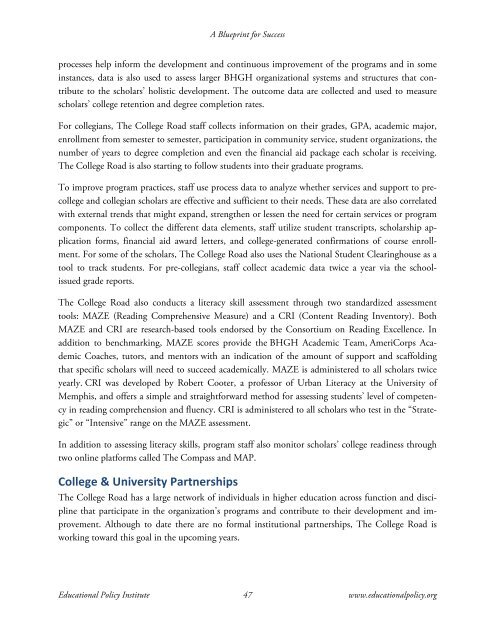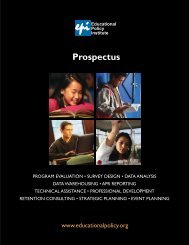A BluePrint for Success: Case Studies of Successful - Educational ...
A BluePrint for Success: Case Studies of Successful - Educational ...
A BluePrint for Success: Case Studies of Successful - Educational ...
You also want an ePaper? Increase the reach of your titles
YUMPU automatically turns print PDFs into web optimized ePapers that Google loves.
A Blueprint <strong>for</strong> <strong>Success</strong><br />
processes help in<strong>for</strong>m the development and continuous improvement <strong>of</strong> the programs and in some<br />
instances, data is also used to assess larger BHGH organizational systems and structures that contribute<br />
to the scholars’ holistic development. The outcome data are collected and used to measure<br />
scholars’ college retention and degree completion rates.<br />
For collegians, The College Road staff collects in<strong>for</strong>mation on their grades, GPA, academic major,<br />
enrollment from semester to semester, participation in community service, student organizations, the<br />
number <strong>of</strong> years to degree completion and even the financial aid package each scholar is receiving.<br />
The College Road is also starting to follow students into their graduate programs.<br />
To improve program practices, staff use process data to analyze whether services and support to precollege<br />
and collegian scholars are effective and sufficient to their needs. These data are also correlated<br />
with external trends that might expand, strengthen or lessen the need <strong>for</strong> certain services or program<br />
components. To collect the different data elements, staff utilize student transcripts, scholarship application<br />
<strong>for</strong>ms, financial aid award letters, and college-generated confirmations <strong>of</strong> course enrollment.<br />
For some <strong>of</strong> the scholars, The College Road also uses the National Student Clearinghouse as a<br />
tool to track students. For pre-collegians, staff collect academic data twice a year via the schoolissued<br />
grade reports.<br />
The College Road also conducts a literacy skill assessment through two standardized assessment<br />
tools: MAZE (Reading Comprehensive Measure) and a CRI (Content Reading Inventory). Both<br />
MAZE and CRI are research-based tools endorsed by the Consortium on Reading Excellence. In<br />
addition to benchmarking, MAZE scores provide the BHGH Academic Team, AmeriCorps Academic<br />
Coaches, tutors, and mentors with an indication <strong>of</strong> the amount <strong>of</strong> support and scaffolding<br />
that specific scholars will need to succeed academically. MAZE is administered to all scholars twice<br />
yearly. CRI was developed by Robert Cooter, a pr<strong>of</strong>essor <strong>of</strong> Urban Literacy at the University <strong>of</strong><br />
Memphis, and <strong>of</strong>fers a simple and straight<strong>for</strong>ward method <strong>for</strong> assessing students’ level <strong>of</strong> competency<br />
in reading comprehension and fluency. CRI is administered to all scholars who test in the “Strategic”<br />
or “Intensive” range on the MAZE assessment.<br />
In addition to assessing literacy skills, program staff also monitor scholars’ college readiness through<br />
two online plat<strong>for</strong>ms called The Compass and MAP.<br />
College & University Partnerships<br />
The College Road has a large network <strong>of</strong> individuals in higher education across function and discipline<br />
that participate in the organization’s programs and contribute to their development and improvement.<br />
Although to date there are no <strong>for</strong>mal institutional partnerships, The College Road is<br />
working toward this goal in the upcoming years.<br />
<strong>Educational</strong> Policy Institute 47 www.educationalpolicy.org




